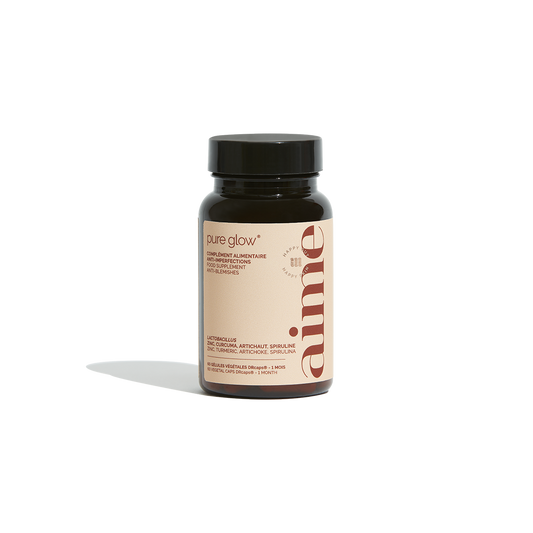Did you know? 90% of the world's population is affected by skin problems at least once in their lives. Far from being reserved for adolescence, blackheads, pimples, shine, and enlarged pores affect approximately 40% of women over the age of 25.
In addition to hereditary factors, hormonal fluctuations due to puberty, menstruation, pregnancy or even medication come into play, sometimes aggravated by pollution, stress, diet or even tobacco.
It's less well known, but using unsuitable products also tends to promote the appearance of blemishes and spots, as well as their recurrence. Sensitizing salicylic acid, potentially allergenic essential oils, or even drying alcohol... We think we're doing the right thing, but repeated use of harsh ingredients risks altering the hydrolipidic film and further deregulating sebum production in combination and oily, acne-prone skin. By stripping, the skin overreacts and produces even more sebum. This is the famous rebound effect!
The cause: a skin imbalance that causes acne
During these periods of hormonal fluctuations, the skin reacts in its own way. Hypersecretion of sebum leads to dilation of the pores, which, if clogged, give way to comedones. This environment is favorable to the development of the C. Acnes bacteria (formerly called Propionibacterium acnes or P. Acnes), which creates inflammation, in the form of a red papule or even a white pustule.
What type of acne do you have?
Mild to moderate acne includes blackheads, whiteheads, papules, and pustules. These lesions are typically treated with gentle cleansers and purifiers.
Severe acne can include nodules and cysts, resulting in marks and scars that cause pigmentation spots. Medical treatment may then be necessary to calm the outbreak.
Whether it is mild or severe acne, it is recommended to consider a basic treatment that induces a better life balance: less stress, a good diet with anti-inflammatory foods, good sleep and regular physical activity.
Our advice? Also take probiotic-based food supplements to rebalance the terrain, like Pure Glow , the ultimate anti-acne Aime formula.
How to stop having acne?
This is a difficult question to answer. It won't go away easily, but you can still reduce flare-ups and space them out over time with a healthy lifestyle and a suitable skincare routine.
Aime's philosophy: By patiently addressing the causes of acne, you give your skin all the tools it needs to regulate itself.
1. Practice impeccable hygiene by cleansing your face, neck and décolleté morning and evening. Follow our tips for perfect cleansing .
The right reflex: Use minimalist formulas to cleanse without unbalancing, and apply a non-comedogenic serum and cream. For this, the trio Aime The Simple Cleanser , The Simple Serum and The Simple Cream are your allies to cleanse and moisturize without overloading combination to oily skin.
Yes, you can wear makeup when you have acne. Makeup artist Margot Priolet talks about misconceptions about acne and makeup .
2. How to remove a pimple? Avoid touching your face! You risk introducing bacteria into the inflamed blemishes and worsening your acne. In the evening, use a spot-removing treatment or patch that accelerates the maturation of the pimple.
3. Yes to anti-acne exfoliation, but gently. This step aims to eliminate dead skin from the stratum corneum, which tends to thicken (keratosis) to the point of clogging pores. Say goodbye to mechanical scrubs, whose aggressive grains induce hyper-seborrhea. Opt for enzymatic formulas that accelerate natural desquamation in about ten minutes. Are you worried about AHAs, and especially BHAs, which are now being questioned for sensitive skin? Azelaic acid from cereals, shikimic acid from star anise, or succinic acid from sugar are promising new avenues.
4. Anti-acne LED sessions . Regularly subjecting the skin to these small diodes that emit a cold light that reaches the different layers of the skin, helps calm inflammation and helps make scars disappear. Session after session, the quality of the skin improves visibly. To do this, go to the LED Bar at Glow Studio Aime , in Paris, for a session adapted to your needs: acne or severe acne.
5. A balanced diet , rich in fruits and vegetables, and low in sugars and dairy products, can help reduce inflammation and improve skin health.
6. Probiotics to rebalance the terrain. When the gut is healthy, everything is healthy. This is the philosophy of Aime, who has developed a best-selling formula to limit acne breakouts: Pure Glow , which balances and purifies the skin from the inside out when you have severe to moderate acne.
Watch Mathilde Lacombe and Claire Borwin, dietician and nutritionist, live on Facebook , with the foods to avoid when suffering from acne and rosacea.
We've covered the topic of acne in general here, but if you're affected by hormonal acne or adult acne, head over to our dedicated article for plenty of information and advice.









